It is one of the most asked questions that bloggers have.
“What topics should I cover in my blog and how do I never run out of content ideas?”
The first part of the question is basically about the niche that you should pick. This is a crucial factor. The second part is about the number of blog posts you will write. I’ll discuss several solutions to boost your imagination and creative mind.
Here is what you’ll learn in this blog post.
How To Choose A Good Niche For Your Blog?

Every blog needs a niche, meaning that it doesn’t cover all kind of topics someone can think about, but is focused on one main topic.
For example, pets are a niche. You should write solely about pets and not about traveling. To distinguish yourself you could pick a niche within a niche.
Your main niche is pets, but if you are interested in dogs, in particular, you have an option to be more specific.
Now you will only attract visitors that are interested in dogs and not in all other kinds of animals.
The rule of thumb is: the more specific your niche is, the better. The reason is that you’ll target people who are highly interested in that specific topic.
That’s why I recommend specifying a little bit more. Instead of ‘dogs’ you’ll only blog about ‘french bulldogs’.
Do you see the difference in interest for a french bulldog lover or a pet lover in general?
So I’m going to list 19 broad niches and their sub-niches below.
- Lifestyle;
- Home; Chairs
- Family; Parents
- Parenting; Children
- Finance; Stocks
- Crafts; Woodworking
- DIY; Finger Painting
- Small business; Local strategies
- Outdoors; Hammocks
- Fitness and health; Crossfit
- Food; Paleo
- Inspiration and advice; Motivational quotes
- Animals; Lions
- Travel; Places in AsiaGames; PlayStation exclusive
- Music; 90’s music
- Relationships; Dating for 50+
- School; University
- Electronics; Televisions
- Swimming: Waterpolo
Having a good niche and a sub-niche for your blog is crucial when you start blogging.
Do You Have To Be An Expert To Start A Blog?
I receive this question quite often and I completely understand why.
You want to provide a lot of value to your readers and in order to do that, you need to have skills or knowledge in a certain field.
Although this is true, it is not necessary to be ‘an expert’.
As long as you don’t present yourself as ‘the authority’ your readers won’t expect that from you as well.
Answer their questions and share thoughts about topics you have some knowledge of, is sufficient when starting out.
Besides, it is likely that your readers know less than you, otherwise they would not visit your blog and ask you questions.
There is only one thing you have to keep in mind.
They’re looking for someone they can learn from.
And that person would be YOU.
That is exactly what you want.
Always make sure that you create content that will help your readers. Because there is one thing you need to keep in mind:
When you’re just starting out, your blog visitors don’t really care what YOU want, they are here because of what THEY want, and they want a solution to their problem.
Now you are aware of this, your task is quite simple.
When you completely focus your efforts on creating blog posts or videos or whatever that provide solutions to their problems, they will do something for you in return.
You helped them with a problem and they thank you for that, for example, through subscribing to your email list, reading more of your content or even purchasing products that you offer without convincing or pitching them to buy it.
So, now do you have a niche for your blog and you have the confidence to write and help your audience.
So you’re probably thinking…
How do I figure out what exact content I need to produce and what do people really find interesting to read? And what if I have nothing to discuss anymore?
These are good question and I am glad you are thinking about it.
There are some principles you have to take in mind when you start creating content.
How To Write Good Blog Posts And Never Run Out Of Content
The first thing you need to do before writing is finding out what topics are popular and what your competition is writing about.
Once you have figured out what is popular, you at least know what people are searching for and are interested in.
After you’ve researched your competition and know exactly what kind of information they provide, you have to surpass them.
Write better content and ethically steal their visitors to your blog.
Once they’re familiar with YOUR blog you need to keep their interest.
To ease this process I want to point out 3 tips to help you attract new visitors to your blog and to keep them satisfied.
Doing keyword research is definitely the difference between earning nothing or earning a fortune with your blog.
Keyword research is basically finding out how popular specific words are in search engines and based on their competitiveness you sprinkle keywords throughout your blog post.
Let’s say that your chosen niche is weight loss and you want to write an article about it.
There are 2 things you could do:
- Just write about whatever pops up in your mind.
- Just write about topics that people are really interested in and isn’t that competitive.
There is nothing wrong with the first option. But chances are that you wouldn’t achieve what you have in mind: helping people solving their problems and make money with it.
With the second option, you’ve done some research on the keywords you should use and know exactly how much traffic you could expect.
Search engine bots crawl your site to see what it is likely about. Using certain keywords means a better understanding and would place your content in front of interested people when they search for matching keywords in Google or other search engines.
So let’s get back to our example.
Weight loss…
If you search for that broad term in Google you will find a lot of articles but it is unlikely you’ll find one that solves problems.
That’s why I recommend using ‘long tail keywords’.
This means that you enter multiple keywords which have less search volume if you combine them.
How many keywords do I need to use in one sentence?
I would say at least 3. So for example: How To Lose Weight As A Beginner in 2018.
Because of the modifiers ‘Beginner’ and ‘2018’ you narrow down your audience if you compare it to ‘How To Lose Weight’.
With this method you can compete with the big (online) fish because they are not interested in very specific articles. They have the funds and ‘authority’ to compete with other big fish to attract visitors with ‘short tail keywords’.
You probably do not have that money.
I hear you thinking:
How to do keyword research properly?
There are multiple ways and strategies to find the right words to use in your blog post.
I’m going to show you exactly how I do keyword research. Before I start writing content I do the following:
3.2.1. Get the FREE ‘Keywords Everywhere’ extension
This is definitely a must-have tool for blogging.
What it does is that it exactly shows the search volume, CPC & competition of the keywords you’re looking for.
It saves a lot of time, and the best part is that it synergizes well with other tools, which I’m going to discuss next.
In the picture below you see how popular a specific search term is.

A recently added feature is the ‘People also searched for’ function on the right side of your screen.
It gives you plenty of alternatives which should help you to find the right long tail keywords.
The Keyword Everywhere extension is a free tool and easy to download.
3.2.2. KWFinder
Another great tool to use is KWFinder.
Like the title of their homepage says: ‘Find long tail keywords with low SEO difficulty’.
How does KWfinder work?
- You just enter your keyword
- Choose your targeted location
- Choose your targeted language
- Press ‘Find keywords’
Depending on your keyword you should see something like this.

On the left side, the details of your chosen keyword and other related suggestions show up. The right side shows ranking information of the 10 websites on the first page of that keyword.
What does it all mean?
- Trends: It indicates the popularity of a keyword in a certain period of the year. ‘Buy swimsuit’ wouldn’t have a lot of search volume in the winter.
- Search: How many times people searched for this keyword in an average month.
- CPC: ‘Cost Per Click’ How much an advertiser pays via Google Adwords when someone clicks on his sponsored link.
- PPC: ‘Pay Per Click’ In this case the level of competition in Google Adwords (the higher, the more competitive)
- KD: ‘Keyword SEO Difficulty’ How hard or easy is it to rank for a certain keyword in the top 10 of Google results.
As you could see in the picture above, it is ‘possible’ to rank for the keyword ‘cat collar’. As a beginner, I recommend you to strictly try to rank for ‘easy’ keywords.
If you’ve noticed it is a short tail keyword. Focussing on long tail keywords, in this case for example, personalized cat collars, would result in an ‘easy’ KD.
So that’s perfect for you!
This tool would ease your keyword research process because it is easy to understand and the ‘difficulty’ feature is very useful.
KWFinder gives you 5 FREE searches.
3.2.3. Ubersuggest
Now we have reached my favorite tool. Ubersuggest has improved lately and I’m really satisfied with their work.
How does it work?
The concept is the same as KWFinder. But it looks like Ubersuggest helps you a lot more with finding long tail keywords.
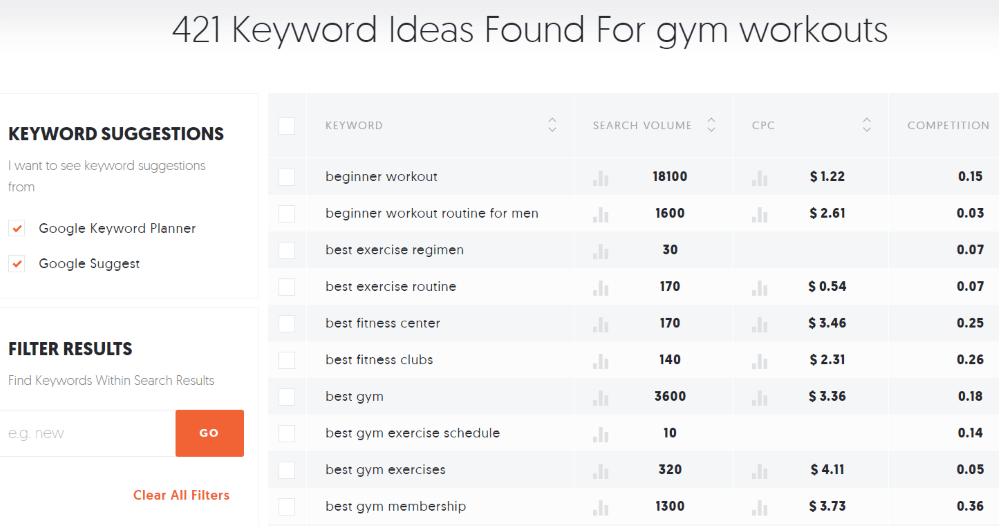
I have searched for ‘gym workouts’ and Ubersuggest found a perfect long tail keyword ‘beginner workout routine for men’.
The best part is that this tool is completely FREE. That’s why I always do a quick research on Ubersuggest.
It is planned that it will integrate keyword difficulty and competitive intelligence in the future as we know from KWFinder.
3.2.4. AnswerThePublic
In one way or another, I often forget this one, although it is really powerful.
Don’t let the auto-played video scare you.

How does it work?
It works like this:
You enter a keyword and this tool will spit out all types of questions, prepositions and comparisons people really search for in search engines.
The results are abundant, so you have a lot of topics to cover in your blog posts.
Let’s say you are in the dog niche.
In our example, we’ve searched for ‘dogs’.
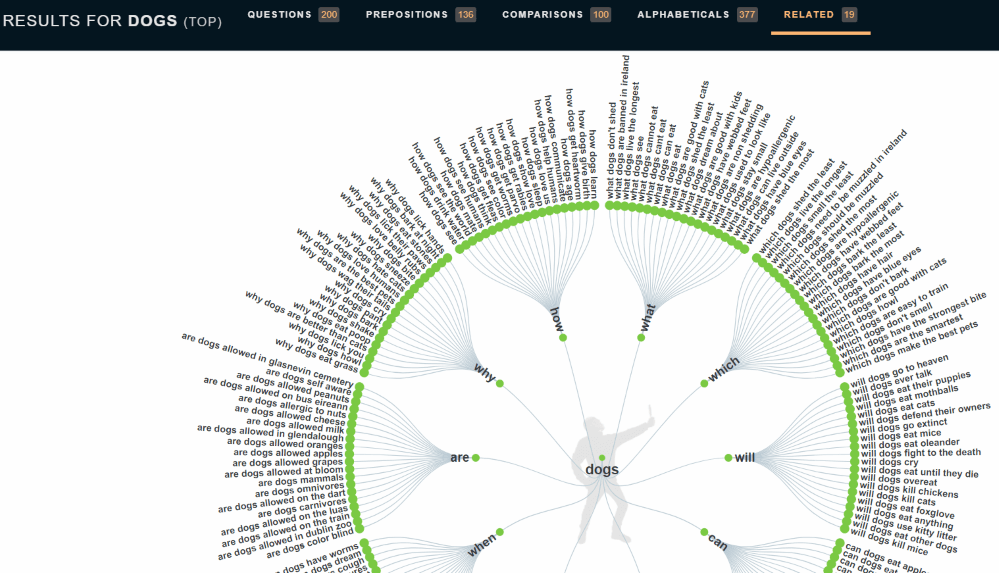
As you can see above, a lot of questions related to dogs are popping up.
- ‘Why dogs eat grass?’
- ‘How dogs see?’
- ‘Can dogs eat popcorn?’
- ‘What dogs dream about?’
- ‘Which dogs shed the most?’
All very interesting topics to create content about.
Besides the unlimited topic ideas this tool provides, there is another feature I really like.
I’d like to refer to the #1 tool that I mentioned ‘Keywords Everywhere’. It synergizes very well with AnswerThePublic, because when you click on ‘data’ instead of ‘visualization’ after you’ve entered your keyword, you see the monthly search volume and competition level displayed next to all the suggested keywords.
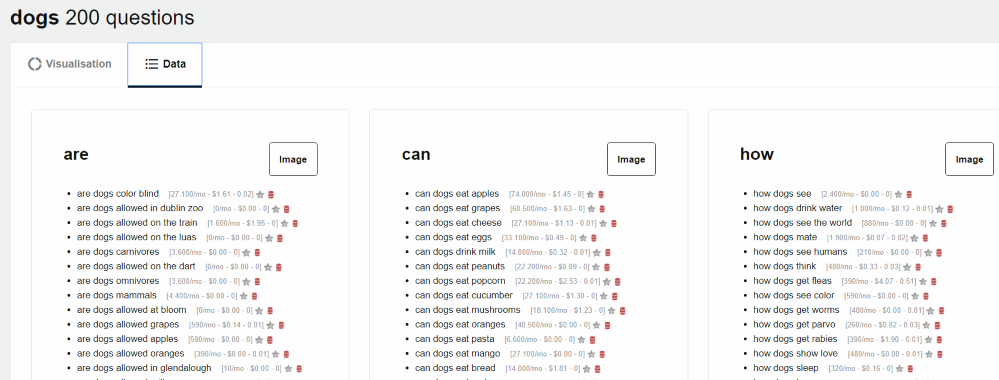
AnswerThePublic is definitely a tool to keep in mind.
Yes, the good old Google.
You are probably thinking: “huh, how?”
And I understand your confusion, but it is easier than you think.
What I explicitly mentioned before is that your goal is to write blog posts about topics people really have searched for, because it means you are able to attract these interested people to your blog.
Chances are you have noticed that when you enter a keyword in Google Search you see recommend search phrases drop down.

These are all sentences people are really interested in and basically asked Google for a solution.
Your mission is to pick one out and start writing and save the other suggestions somewhere if you’re having a shortage of content ideas.
Not only in the Google search bar you’ll find suggestions but also at the bottom of the search page, you’ll find related search terms.
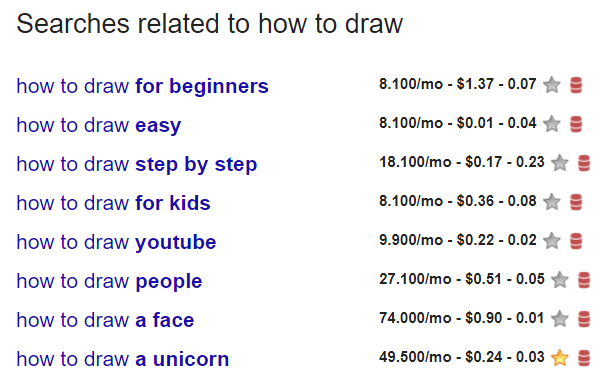
As you can see, all long tail keywords.
I have another trick for you.
Just click on one of the suggestions Google provides, check out what websites are ranking in the top 5, analyze their content, if you are sure that you can create better articles on certain topics then them, just do it.
Google will reward you because you give the reader a better solution to their problem than your competitor.
Like I said, in the beginning of your blogging career you primarily write for your audience to help them and show interest in them.
3.2.6. Youtube Search
The same principle applies to Youtube.
Youtube is after Google the second largest search engine in the world. That means you have a lot of opportunities to do proper keyword research.
Enter your keyword and Youtube suggests you related and highly searched keywords as well.
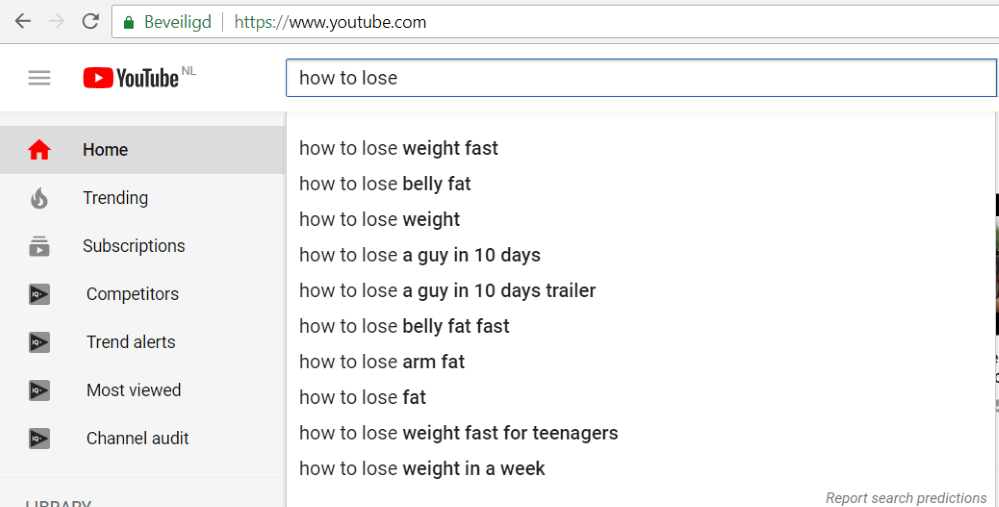
What you do next is head over to the channels of the top 5 videos that show up and analyze their most popular videos.
Why?
Because apparently, they did something that Youtube liked and stimulated, otherwise they didn’t receive that many views.
How do you know what their most popular videos are?
Go to their channel > videos > sort by > most popular.
Analyze their title, analyze their video description, analyze their thumbnail, analyze their tags, analyze everything you can think of.
Once you (or their viewers because of the feedback they drop in the comments) have figured out what kind of things they did well and what parts need more improvement, you simply create a better piece of content from your research.
How do you create better content if it is already good?
Well, you’ve read the feedback from their viewers and most of the time they still have questions.
So there is always room for improvement.
Apart from that, try to explain better, use more examples, add more personality so they can relate more, use more visuals in your videos, so they get a better watch experience.
What it comes down to is that there are a lot of keyword research strategies to use that will attract highly targeted visitors to your blog (and videos).
I already gave you my 6 favorites.
3.3. Just ask your following what topics they are interested in.
Sometimes we think way to complicated about things and are they much simpler than we expect.
This is a perfect example.
Once you start to write a bunch of blog posts, have a social media presence, gained a little bit of traffic and even got a small loyal following, it is not a bad idea to just ask what they want from you.
I’m going to mention it for the third time: your goal is to help your readers.
So what is wrong with asking them what kind of topics they want to know more about and how you could be valuable to them?
How do I survey them best?
There are several ways, but these always work:
- Send a good old email to your subscribers, assuming you’ve set up an opt-in to collect their email address. Just send a quick broadcast message: “Hey, how is your day, do you need help with something or what would you like to know more about”. Chances are, they are eager to tell you because they want their problems to get solved.
- In addition to option #1, set up a short online survey for free at freeonlinesurveys.com. Mail your subscribers if they want to take part in the survey and analyze the results.
- Be active on social media. If you are smart you’ve created social media accounts for your blog so your presence will improve a lot and there is a higher chance to stand out. Nobody died to ask their followers on Facebook, Instagram or Youtube what kind of content they like to see. So leverage your social media accounts to gain ideas easily.
I can guarantee that your fanbase would love to interact with you.
3.4 Write about personal stuff once you’ve built an audience
This really depends on what kind of niche you are in and how you presented yourself from the beginning.
Do you love to write more from a personal perspective? Do you use the word ‘I’ a lot?
Or is your blog more based on facts presented without a real face behind the blog? Think of news websites or magazines.
If you fall into the first category, it might be useful to blog more about your personal stuff once you’ve built an audience.
They know you, they trust you and they respect you. All ingredients for a good relationship.
It is not unthinkable they want to know more about you as a real person. They’re likely interested in what keeps you busy or how you handle some struggles, what your journey is, your goals et cetera.
This type of content is what creates dedicated fans and lifetime customers.
Does this mean that you have to solely focus on personal posts, once you start to become popular?
No.
I should say utilize 1 out of 10 blog posts to show your personal side.
But when you have no clue what to write about, a personal story is a great idea.
Well, that is it I guess. It is not complicated to find out what blog post topics you could write about and how you would never run out of content anymore.
To summarize it briefly:
- I covered how to choose a good niche for your blog, where I gave you 19+ ideas and I recommended to use sub-niches.
- I answered the question if you need to be an expert to start a blog. You just need to know a little bit more than the average joe to help people.
- I discussed how you write good blog posts and never ran out of content, where I showed you my keyword research strategy and tips to interact with your following and gather content ideas at the same time.
Now I want to turn it over to you:
What strategy are you going to use to get more blogging ideas?
Or which method works for you the best?
Either way, let me know by leaving a comment below right now.
By the way if you enjoyed this post you will love my free email course on how to start a blog below. Check it out now!











